The Cost of Freedom. The Life and Death of Sgt. John Basilone PART 2
Sent home from the Second World War to a hero's welcome after being awarded the Medal of Honor, he pleaded to be allowed to go back to the war in the Pacific.
The original version of this story appeared on Facebook Bulletin in 2022. I am re-posting it on this Memorial Day 2025 to remind us all of what this holiday represents.
Find the cost of freedom
Buried in the ground
Song by Crosby, Still, Nash and Young
John Basilone welcomed home in Raritan, N.J., 1943 photo credit: Raritan Public Library
In the summer of 1943, Marine Gunnery Sgt. John Basilone was safely back in the United States.
The previous fall, on the island of Guadalcanal in the South Pacific, he had led the remnants of his battered unit as they fought off waves of Japanese infantry for nearly three days. Twice, Basilone had made his way under intense enemy fire to retrieve caches of ammunition, then manned the two remaining functioning machine guns to help hold the line and prevent the enemy from recapturing the island's air field. For his actions, he was awarded the Medal of Honor.*
Accounts of Basilone's heroics were told and retold in the media. His Hollywood good looks were splashed across newspapers, magazines and newsreels. He became a national hero. Keenly aware of this, the military assigned him to go on a national tour to promote war bonds.
Basilone, now 26, dutifully hit the road, traveling from city to city at promotional events, often accompanied by movie stars and military brass. On September 19th, in his hometown of Raritan, New Jersey, tens of thousands of people turned out for a parade in his honor. The smiling war hero wav ed to the adoring crowd from atop an open convertible. It was, he said, a dream come true.
Privately, he was itching to get back to the war.
I asked Mike Cerre, my friend and former ABC News colleague who served in the Marines in the Vietnam War, to try to imagine why Basilone, safe and secure back in the U.S. after the horrors of Guadalcanal, would want to go back into harm's way.
"His courage ran deep, his loyalty for the Marines," Mike said. "Even though the Marines Corps said, 'We want you raising war bonds, that's the best thing you can do,' he wanted to get off the war bond tour. He felt guilty."
Again and again, Basilone pleaded to be sent back to the Pacific theater, where the tide had turned following the American victory at Guadalcanal. Again and again, the military turned him down.
While he continued his war bond tours, Basilone was assigned to the Washington (D.C.) Navy Yard. He went to see the base commander to again request a combat assignment. Once again, it was denied.
Eventually the decision was made to accede to Basilone's plea. He was assigned to the Fifth Marines at Camp Pendleton, California to help train a group of new Marines and go with them when they were sent into battle.
Photo credit: Raritan Public Library
Decades later, Chuck Tatum, then 17 years old, would recall in his memoir, Red Blood, Black Sand:
"On my third day at Pendleton, I was sitting on my bunk when I heard footsteps echoing through the empty barracks. I looked up, and through the hallway came a cheerful-looking Marine in dress greens.... I jumped to immediate attention after spotting the sergeant's stripes on his sleeve. Combat ribbons decorated his left chest. Looking straight at us, a smile crossing his lips, the new arrival said quietly and with authority, 'At ease, men. How's everything going? I'm Platoon Sergeant John Basilone.' He was husky, with genial handsome looks... While I responded to his greeting, it hit me! I was in the presence of a Marine Corps legend. I didn't know what to say or do. This was like meeting a movie star, or a president of the United States!"
One evening, at a social event at the Marine camp, Basilone met a young female Marine named Lena Riggi. He asked her out. A month later, they were married -- on July 10, 1944. A month after that, Basilone and his unit shipped out to Hawaii where they would spend the next six months training for a top secret mission.
John Basilone and Lena Riggi married in 1944 photo credit: Raritan Public Library
In January 1945, they joined a massive convoy heading east from Oahu across the Pacific. Their destination was finally revealed to them. An eight-square-mile speck of an island called Iwo Jima.
Iwo Jima was about 700 miles from Japan. The plan was to wrest control of it from the Japanese, and from there be able to launch bombing raids on the Japanese mainland. More than 20,000 Japanese troops were waiting for them, heavily fortified, dug in and determined to fight to the last man.
On February 19, 1945, at 9 a.m., the invasion began as thousands of Marines stormed ashore.
"Marines began to land in intervals," according to the Encyclopedia Britannica. "They were surprised to encounter embankments of volcanic ash towering some 15 feet high. What was supposed to be an easy and methodical landing process quickly became congested, and (Japanese commanding General Tadamishi) Kuribayashi maximized the confusion by directing his troops and artillery to fire on (them)."
Marines land on Iwo Jima, 1945. Photo credit: Archives Branch, USMC History Division
It was a massacre. The Marines were pinned down on the beach under a furious artillery barrage.
"Everyone on the beach was caught in a giant sand trap of death," Tatum wrote. "We were overwhelmed with white-hot steel. Blind fear and consternation swept the shoreline as men furiously dug into the loose sand... The enemy used their powerful advantage of height and better visibility to pour fire down on us.
"I noticed one Marine walking back and forth on the shore, among hundreds of prone figures, kicking behinds, shouting cuss words, and demanding, 'Move out! Get your butts off the beach!' He gave the Marine Corps hand signal for 'follow me.' A group of men responded. Fascinated, I wondered why he wasn't digging in like the rest of us? As he advanced I recognized that the solitary Marine was none other than Gunny John Basilone!" He showed no fear, as if this invasion was no more than a serious training maneuver... His leadership and courage were overwhelming."
Basilone led attacks on enemy bunkers in the teeth of ferocious fire that was cutting down Marines all around them. At one point, he personally guided a tank out of a minefield. Then he went back to the beach to rally another group of Marines that had just landed.
From a bomb crater, Tatum watched.
"I gingerly peered from our position toward the landing beach," Tatum recalled in Red Blood, Black Sand. "Seventy-five yards away, a group of Marines was advancing toward the runway with Basilone in the lead. I felt momentary elation -- Gunny Basilone was coming back with more men. Then I heard enemy rounds falling to earth. I watched in horror as the explosions tore Basilone's party apart. It was awful.... I don't remember when, but sometime that afternoon, the Word reached us. 'Basilone is dead.'"
Basilone would be posthumously awarded the Navy Cross. The citation read in part: "His unwavering devotion to duty throughout the bitter conflict was an inspiration to his comrades and reflects the highest credit on Gunnery Sergeant Basilone and the United States Naval Service. He gallantly gave his life in the service of his country."
To this day, the town of Raritan, New Jersey remembers John Basilone. His story is taught in schools, and told and retold by the people of his hometown, passed down from one generation to the next. Each September 19th - the same day he was honored in his hometown after returning from Guadalcanal - the town of Raritan holds a parade in his honor. It ends at a statue to Basilone.
"It's the best day of the year," Raritan's mayor, Zachary Bray, told me. "You can just feel it in the air. It's a day to be proud."
The story of John Basilone is taught to Marine recruits in boot camp.
"Every Marine knows of John Basilone," Cerre said.
I asked retired Air Force Major Gen. John Borling about Basilone. During the Vietnam War, Borling's plane was shot down, and he spent six years in a North Vietnamese prison. When he got out, he went back to the Air Force.
"John Basilone found expression and meaning and self-worth in war, so elusive pre-war and so consuming during," he said in an email. "We can imagine post-war potential, but reality intrudes so ruthlessly on so many. So laud and applaud Sgt. John Basilone for all time. He took what he wanted from life, what he needed to take and paid for it. Fair bargain for him and for we, the living."

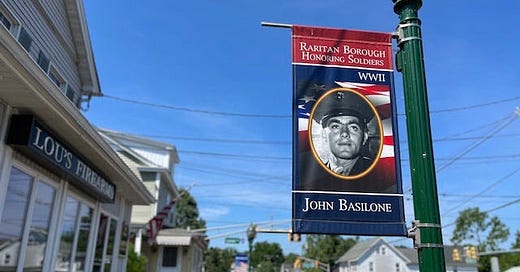



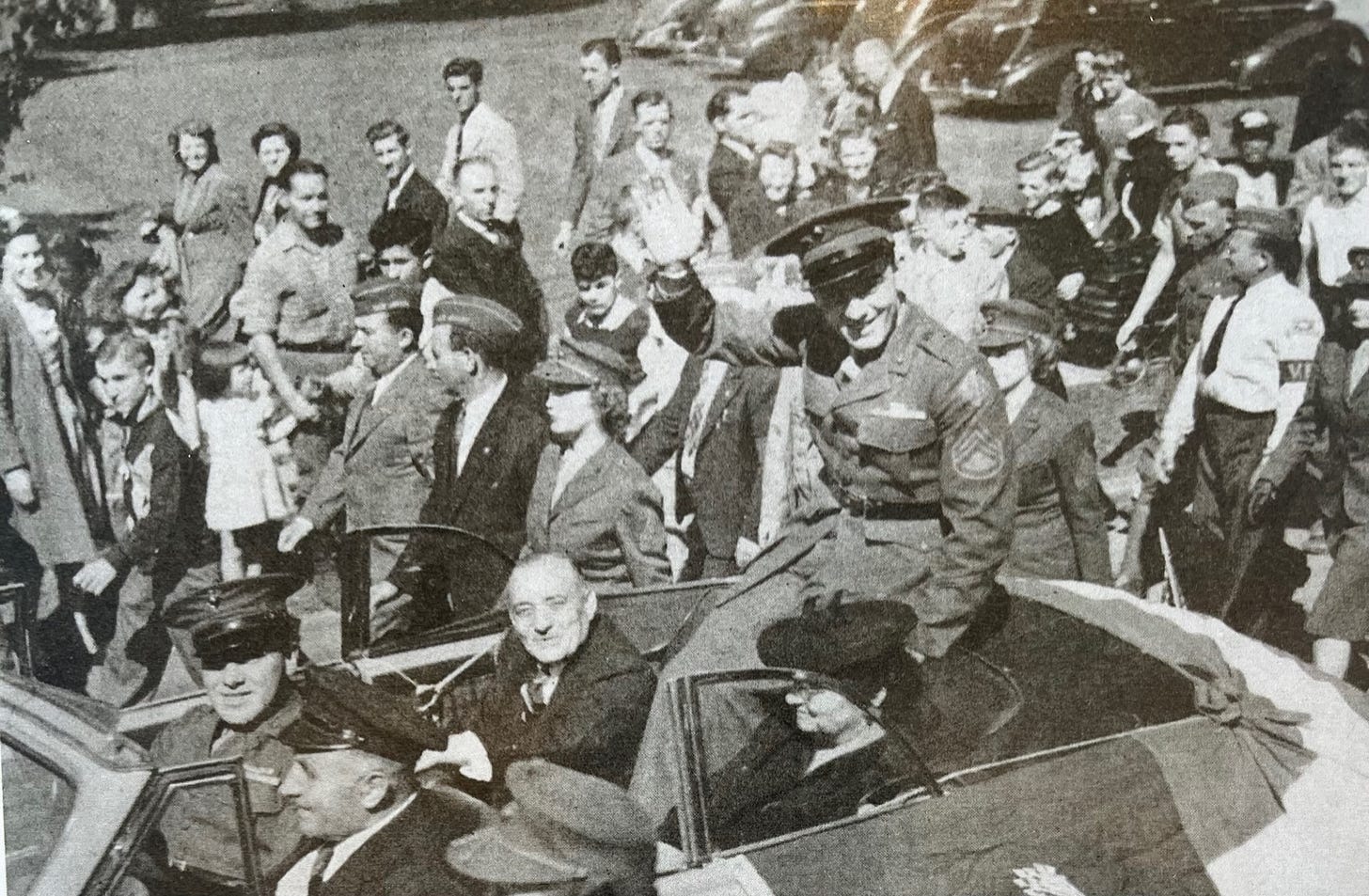
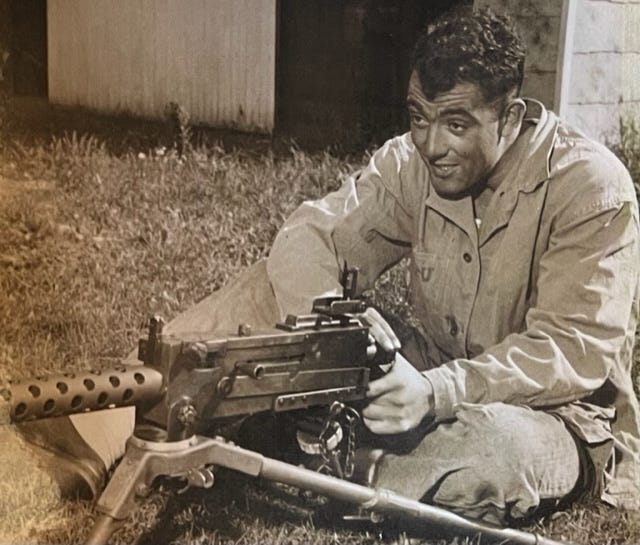

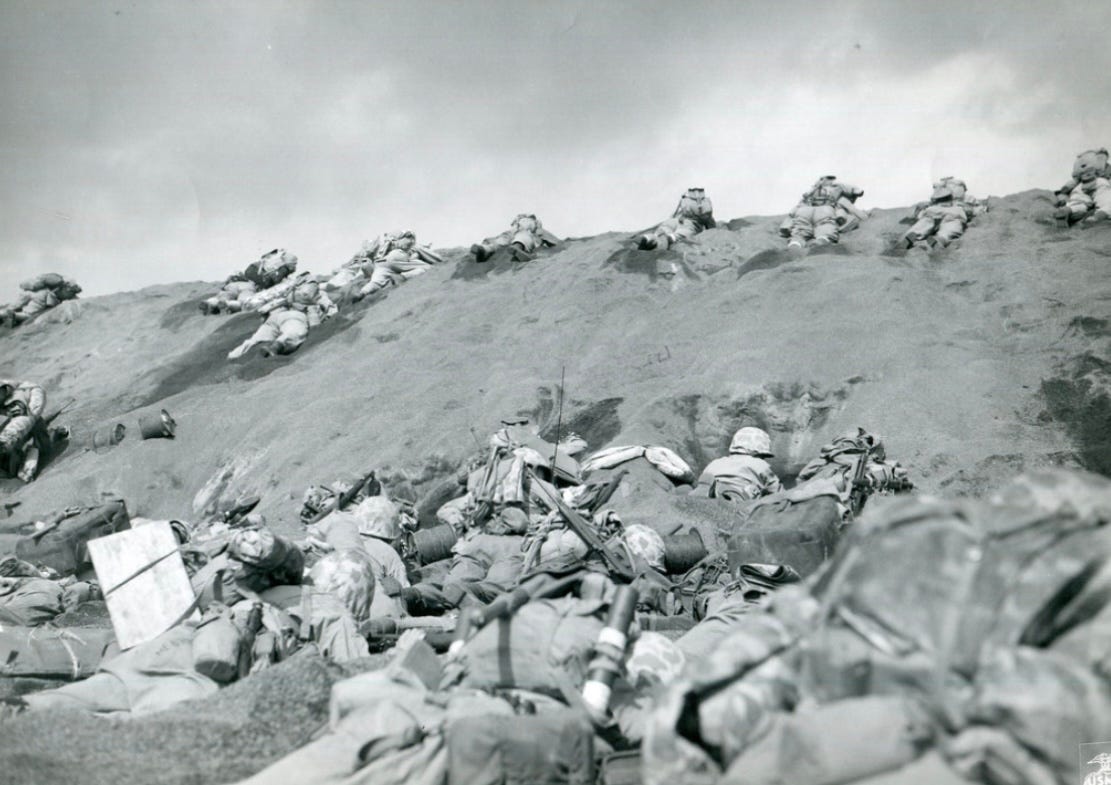
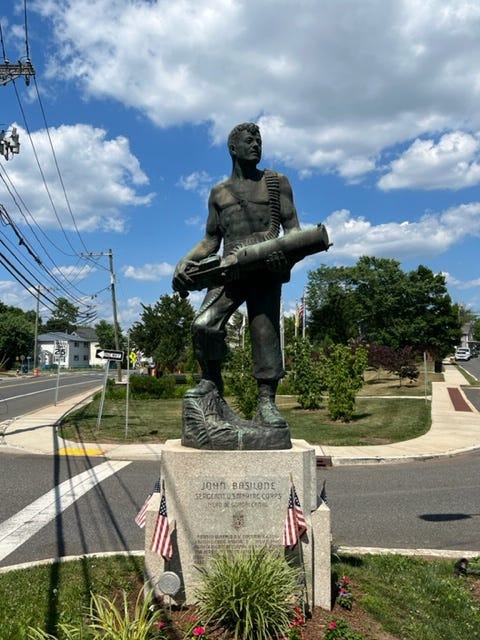
Ron...Thank you for paying attention and motivating us to pay attention.
It's important. Thank you!
Ron - thank you for sharing this important piece of history with us! What a great, brave man he was...:)